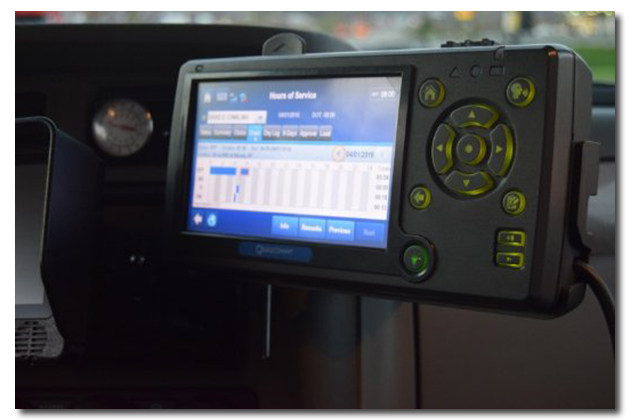How the ELD Mandate Will (and Won’t) Change the Marketplace

The recent electronic logging device (ELD) mandate has raised concerns on how it will affect the marketplace.
The recent electronic logging device (ELD) mandate has brought up a lot of questions.
A few weeks ago, we looked at providing some of the basic information about the mandate.
Today I want to answer some of the more specific questions about how the mandate will influence the market - and how it won’t.
How much capacity will this remove from the market between now and December 2017?
A common view is that 30-40% of commercial drivers already use ELDs or automatic on-board recording devices (AOBRDs), which leaves up to 70% of drivers who will have to comply within two years.
There seems to be two distinct and different discussions that stem from this question. The first depends on your assumptions about how many drivers consistently violate hours of service (HOS) rules to run more miles per day than they are legally able to.
Drivers can legally drive up to 55 hours per week. If you think paper log drivers average 60 hours per week now, that could indeed cause a potential reduction of hours. If, on the other hand, you think drivers currently have a difficult time driving all 55 hours allowed because of scheduling, loading, and unloading issues, then there would be no noticeable change in available productivity.
The second answer to this question involves some deeper knowledge about recording hours. On paper logs, 15-minute increments are used to record hours, while ELDs record to the minute. If a driver changes status three or four times per day, he or she could legally lose 20-30 minutes of on the road time if he or she switched from paper logs to ELDs.

How much does an ELD cost?
The Federal Motor Carrier Safety Administration (FMCSA) was sensitive to the issue of costs and eliminated a couple of proposed requirements to reduce costs to carriers. The FMCSA estimates that it will cost an average of $584 per truck to purchase and install an ELD, with an estimated ongoing monthly service fee of $20 per truck.
The FMCSA will allow ELD applications for smartphones to comply. This may bring down the cost of ELD compliance significantly.
Do ELDs make carriers less efficient?
The FMCSA specifically outlines paperwork and record keeping requirements that are eliminated by ELDs. In addition, a number of studies have concluded that after the learning curve of adopting an ELD, carriers actually experience increased efficiency through better visibility, predictability, and planning tools through the ELDs. This is one major reason that up to 40% of all drivers voluntarily use ELDs today.
Will shippers have to monitor drivers’ HOS?
No. Nothing in the ELD final rule or the Coercion final rule requires shippers or brokers to actively monitor and manage individual drivers’ HOS compliance.
How will the mandate affect drivers who cross U.S. borders into Canada and Mexico?
Drivers who regularly haul cross-border freight will be required to use ELDs if they are within the United States. However, if the driver enters the United States fewer than eight times per month, or does not travel outside of a 100-mile radius of the border, he or she will qualify for an exemption from the ELD rule. It should be noted that some ELDs on the market allow for multiple HOS protocols.
What happens if a driver does not meet the required implementation deadline?
A driver who is required to use ELDs and does not could be placed out of service, similar to if the driver was driving on a suspended commercial driver’s license (CDL).
Are ELDs also GPS systems? Does this mean all drivers will be satellite tracked and traced within two years?
The FMCSA does require time and location stamps for certain events (such as transitions into or out of driving time and every hour of driving time); however, they are very careful to say that the ELD rule is not intended in any way to require location monitoring of any sort. ELDs are specific to a driver and not a load or truck.
There is no standard transmission data or service required by the FMCSA for location data, so this would need to be established though the driver’s employer or a third party service or application, just like it is today.
While we looked at the mandate in further detail today, you may still have lingering questions. Be sure to check out the FMCSA website and talk to your logistics provider - especially if you have specific concerns about how the mandate will affect your business.
Article Topics
C.H. Robinson News & Resources
Q&A: Mike Burkhart on the Recent Nearshoring Push Into Mexico Q&A: Mike Burkhart, VP of Mexico, C.H. Robinson C.H. Robinson introduces new touchless appointments technology offering C.H. Robinson President & CEO Bozeman provides overview of key logistics trends and themes at SMC3 JumpStart 2024 C.H. Robinson touts its progress on eBOL adoption by LTL carriers and shippers Retailers Pivot Supply Chain Strategy, Seek Red Sea Alternatives C.H. Robinson announces executive hire to run new Program Management Office More C.H. RobinsonLatest in Transportation
Baltimore Bridge Collapse: Impact on Freight Navigating Amazon Logistics’ Growth Shakes Up Shipping Industry in 2023 Nissan Channels Tesla With Its Latest Manufacturing Process Why are Diesel Prices Climbing Back Over $4 a Gallon? Luxury Car Brands in Limbo After Chinese Company Violates Labor Laws The Three Biggest Challenges Facing Shippers and Carriers in 2024 Supply Chain Stability Index: “Tremendous Improvement” in 2023 More Transportation











